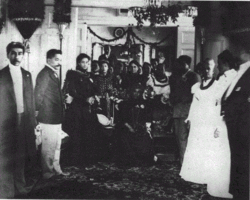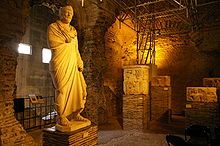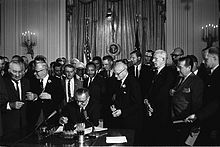 On this day in 1898, U.S. President William McKinley signs the Newlands Resolution annexing Hawaii as a territory of the United States.
On this day in 1898, U.S. President William McKinley signs the Newlands Resolution annexing Hawaii as a territory of the United States.
In 1898 President of the United States William McKinley signed the treaty of annexation for Hawaii, but it failed in the senate after the 38,000 signatures of the Ku’e Petitions were submitted. After the failure Hawaii was annexed by means of joint resolution called the Newlands Resolution.
The Territory of Hawaii, or Hawaii Territory, was a United States organized incorporated territory that existed from July 7, 1898, until August 21, 1959, when its territory, with the exception of Johnston Atoll, was admitted to the Union as the fiftieth U.S. state, the State of Hawaii.
The U.S. Congress passed the Newlands Resolution which annexed the former Kingdom of Hawaii and later Republic of Hawaii to the United States. Hawaii’s territorial history includes a period from 1941 to 1944 – during World War II – when the islands were placed under martial law. Civilian government was dissolved and a military governor was appointed.
Newlands Resolution of 1898
On 7 July 1898, McKinley signed the Newlands Resolution (named after Congressman Francis Newlands) which officially annexed Hawaii to the United States. A formal ceremony was held on the steps of ‘Iolani Palace where the Hawaiian flag was lowered and the American flag raised. Dole was appointed Hawaii’s first territorial governor.
The Newlands Resolution said, “Whereas, the Government of the Republic of Hawaii having, in due form, signified its consent, in the manner provided by its constitution, to cede absolutely and without reserve to the United States of America, all rights of sovereignty of whatsoever kind in and over the Hawaiian Islands and their dependencies, and also to cede and transfer to the United States, the absolute fee and ownership of all public, Government, or Crown lands, public buildings or edifices, ports, harbors, military equipment, and all other public property of every kind and description belonging to the Government of the Hawaiian Islands, together with every right and appurtenance thereunto appertaining: Therefore, Resolved by the Senate and House of Representatives of the United States of America in Congress assembled, That said cession is accepted, ratified, and confirmed, and that the said Hawaiian Islands and their dependencies be, and they are hereby, annexed as a part of the territory of the United States and are subject to the sovereign dominion thereof, and that all and singular the property and rights hereinbefore mentioned are vested in the United States of America.”
The Newlands Resolution established a five-member commission to study which laws were needed in Hawaii. The commission included: Territorial Governor Sanford B. Dole (R-Hawaii Territory), Senators Shelby M. Cullom (R-IL) and John T. Morgan (D-AL), Representative Robert R. Hitt (R-IL) and former Hawaii Chief Justice and later Territorial Governor Walter F. Frear (R-Hawaii Territory). The commission’s final report was submitted to Congress for a debate which lasted over a year. Congress raised objections that establishing an elected territorial government in Hawaii would lead to the admission of a state with a non-white majority.




